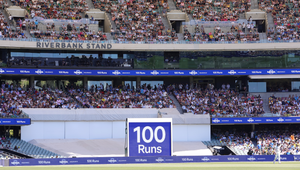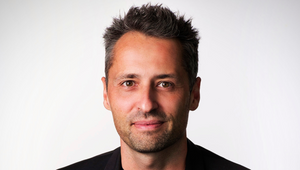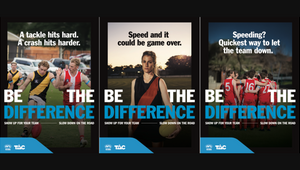
Planning for the Best: Lisa Divett Says Planners Deserve More Glamour

Lisa Divett started her career at a small indie radio station you might have heard of, George FM, broadcasting from Ponsonby Road. Deciding the breakfast show wasn’t going to pay the bills, she switched to qualitative research before being tempted to join the agency world as a planner working on Coca-Cola.
She’s worked across New Zealand’s best advertising agencies on both corporate and government business, including The Campaign For action on Family Violence, and the conception of the platform “It’s not ok”.
Additionally, she has worked with the Energy Efficiency and Conservation Authority, the Ministry of Primary Industry, and the Ministry of Health’s ‘The Journal’ and ‘The Lowdown' projects.
Lisa has also made significant contributions through her work promoting diversity and opportunities for Māori in the creative industry. She’s proudly served as convenor of judges for Effie Aotearoa for the past three years.
She has an annoying habit of constantly asking questions to ensure we are truly solving the right problem. For this, she apologises in advance.
LBB> What do you think is the difference between a strategist and a planner? Is there one?
Lisa> Honestly, I have no idea. My first job in advertising -- many years ago - my boss used to say you start out as a planner and, if you get good enough, you get to become a strategist. But none of us really understood what that meant.
Ironically, James Hurman and I worked together back then, and we used to laugh about how “strategist” sounds incredibly wanky and “planner” is nonsensical.
I’m not sure either term really captures the role. It’s more about what you actually do. He would talk about effectiveness. But I think he’d also talk about creativity -- the power of it -- and the role that we play to bring a perspective to people, to help unlock creativity, unlock growth, unlock a new way of seeing things.
Whether that’s a strategist’s role or a planner’s role -- I don’t think that really matters. I think it’s about the ability to help people see a way through to something else.
LBB> So which label fits you best -- strategist or planner?
Lisa> Honestly, I think both labels are flawed. People hear “planner” and ask if I plan media, and I say, “No.” A planner tends to think abstractly -- not necessarily about timelines or logistics.
LBB> So, is there a better label you’d choose?
Lisa> A strategic planner?
LBB> We’re used to hearing about the best creative advertising campaigns, but what’s your favourite historic campaign from a strategic perspective? One that you feel demonstrates great strategy?
Lisa> So, there’s a piece of communication that I love and often think about, and weirdly, it's both the marriage of strategy and creativity that makes it so magical for me.
It was a piece of work called Honda Grrr. It was under their “Power of Dreams” platform, when Honda were looking at how to make diesel engines cleaner.
Everything about it in terms of the philosophy that informs it -- “Hate something? Change something. Make something better.” I think it's such a powerful way of framing an approach to life as well.
I love this strategy in terms of we had this really difficult problem, and we needed to unlock it and change it.
I love the momentum and the impetus behind it: We hated something, but rather than go, we hate it -- we actually thought, “How are we going to change something and make it better?” It was a way of thinking and framing life itself.
LBB> When you’re turning a business brief into something that can inform an inspiring creative campaign, what do you find the most useful resource to draw on?
Lisa> I think being interested in humans constantly is one of the most interesting and helpful resources to draw upon, and then that collective sense of the experience that you accumulate across different patterns and different ways of working.
An endless curiosity about people. Humans are the most interesting resource we have. You gather insights, patterns, and experiences, and then simplify all that complexity into something clear and useful. It’s about finding the springboard.
LBB> What part of the strategic process do you enjoy the most?
Lisa> I’ll start with what I like least: the beginning. That moment when a project lands and everyone turns to you asking, “What are we going to do?” I always think, “I have no idea - I’m about to be exposed!”
But then, something shifts. You come out of the haze and you begin to sense a shape, a direction. That’s the part I love -- when possibilities start to take form. It’s exciting, even if it’s not yet solid.
LBB> Are there any strategic maxims or frameworks you return to again and again?
Lisa> One I still find useful is the “Get/Who/To/Buy” model from BBDO. It distils everything -- who we’re talking to, the insight, the thought that’s going to unlock that space, the change we want to create as a result of this work. What is the shift that’s going to occur and how are we going to do that?
The simplicity of that is the distillation of a lot of thinking. It’s quite a helpful framework.
The rest of it -- how you get there, what you draw upon -- every time it’s different. So it’s about having a wide toolkit so you can say, "Right now it’s interesting in this space and I’m going to explore here -- I’ll use this framework," versus having a consistent set that I always go to, one thing -- that would get really boring.
LBB> You must have internalised most of that by now, so it must be more gut feel rather than I must reference this specific technique or tool?
Lisa> I think you pick and choose depending on the client and what you know is going to provide them with a sense of security or assurance. There is still a sense that you have a wide ‘playground’ -- and you decide “Where do I want to play? What’s going to be the most helpful? What’s the most fun? And how are we going to explore this? “
LBB> What do you look for in creatives you work with? What do you want them to do with the information you give?
Lisa> A shared trait in terms of being interested and curious and empathetic. That’s what makes for a strong creative relationship. You have to build trust - it doesn’t happen instantly, and nor should it. You want them to be engaging in the conversation -- and you use them to make sure that where you’re headed strategically is going to be a springboard for them but when it builds, it becomes a real dialogue.
Your thinking should be a springboard for their creativity, and their ideas should have strategic strength. It’s reciprocal. That sense of a shared trust, shared respect… and fun! Be a friend, not a gatekeeper.
You don’t want to be constantly second-guessing if what you said made sense. Imposter syndrome can be loud. But trust makes it quieter. I’ve had relationships with some creatives that lasted years, across projects and agencies so you’re already starting at a position of trust – but also it’s kind of fun when you have to figure out how to work with somebody all over again.
LBB> There’s a negative stereotype about strategy being used to validate creative ideas, rather than as a resource to inform them and make sure they’re effective. How do you make sure the agency gets this the right way round?
Lisa> You can only ever be who you are. If you’re in an agency where strategy is just validation, you either try to change that -- or you leave.
I’ve been incredibly lucky that across my career, for the most part, the agencies have actually seen planning as part of the creative process -- it’s a creative endeavour in its own right – rather than a post rationalisation of a creative articulation.
LBB> What have you found to be the most important consideration in recruiting and nurturing strategic talent?
Lisa> Empathy, interestedness and curiosity. You want people who are genuinely interested -- not just in advertising, but in life. They should be reading great books, watching good films, going to galleries, listening to conversations around them because they are interested in humans… just taking in the world.
You can teach someone to write a brief. But being interested in people? That’s the real skill. Take public transport. Go to the supermarket. Don’t live in an ivory tower.
LBB> In recent years it seems like effectiveness awards have grown in prestige and agencies have paid more attention to them. How do you think this has impacted on how strategists work and the way they are perceived?
Lisa> As someone who convened the Effies for three years - I have thoughts!
We are in the world of commercial creativity or behaviour change. So fundamentally we aren’t here to make beautiful art -- we’re making work that has to be effective.
And the effectiveness awards just start to prove the efficacy of our work so we should actually be able to garner better money, better budgets because we are actually unlocking the growth of organisations.
Effectiveness just reinforces that and proves that.
That doesn’t mean there isn’t a role for great creativity in that! It’s about creativity that unlocking growth and then demonstrating effectiveness.
LBB> Do you have any frustrations with planning/strategy as a discipline?
Lisa> Only when it’s not treated as creative. That gets frustrating. When you’re told, “Thanks, you’ve done your bit -- off you go.” You want to have a voice throughout the process.
When it comes to things like casting… casting is actually strategic as well. Who you cast reflects culture - it’s a message about who your audience is and how you see them.
Also, I’d love a little more glamour in planning. It’s not just focus groups in Te Kuiti… or other small towns. There’s not a lot of going to France! Even things like going out on a shoot! Planners don’t get invited to shoots. It’s disappointing.
LBB> What advice would you give to anyone considering a career as a strategist/planner?
Lisa> It’s the best part of advertising. If you’re going to work in this industry - be a planner. Or a strategist. Or a strategic planner. Whatever you want to call it!














